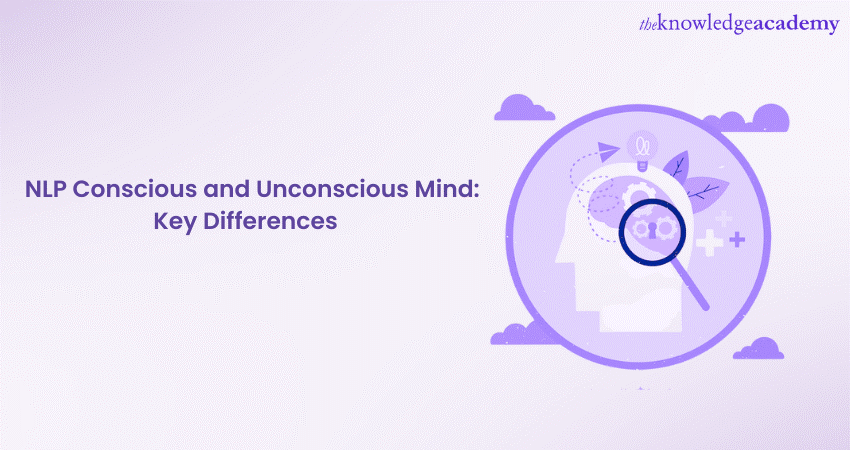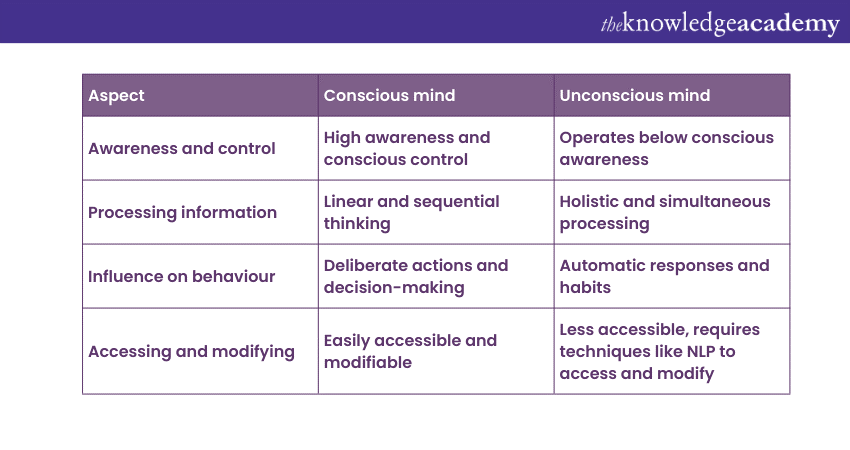We may not have the course you’re looking for. If you enquire or give us a call on 0800 446148 and speak to our training experts, we may still be able to help with your training requirements.
Training Outcomes Within Your Budget!
We ensure quality, budget-alignment, and timely delivery by our expert instructors.

In the field of psychology and Neuro-Linguistic Programming (NLP), understanding the Conscious and Unconscious mind is crucial. Both the Conscious and Unconscious minds play significant roles in shaping our thoughts, behaviours, and overall experiences. In this blog, we will delve into the key differences between the NLP Conscious and Unconscious Mind, exploring their functions and how they impact our lives.
Table of Contents
1) Understanding the Conscious mind
2) Exploring the Unconscious mind
3) NLP Conscious and Unconscious Mind: The differences
a) Awareness and control
b) Processing information
c) Influence on behaviour
d) Accessing and modifying
4) Applications of NLP in understanding the Conscious and Unconscious mind
5) Conclusion
Understanding the Conscious mind
The Conscious mind represents our present awareness and rational thinking. It encompasses thoughts, feelings, and perceptions that we are actively aware of at any given moment. It plays a crucial role in decision-making, critical thinking, and Problem-Solving. The Conscious mind enables us to analyse situations, apply logic, and make deliberate choices. It is the realm of our waking consciousness.
Exploring the Unconscious mind
The Unconscious mind, on the other hand, refers to the vast realm of thoughts, memories, emotions, and beliefs that exist beyond our conscious awareness. It operates outside our immediate awareness but still influences our thoughts, behaviours, and experiences. The Unconscious mind stores deep-seated beliefs, past experiences, and automatic responses. It is the reservoir of our habits, emotions, and instincts.
Take control of your mind and transform your life with NLP by joining our Neuro-Linguistic Programming Courses today!
NLP Conscious and Unconscious Mind: The differences
This section of the blog will delve deeper into the differences between Conscious vs Unconscious Mind in NLP.

Awareness and control
The Conscious mind is characterised by its high level of awareness and control. It represents our present state of awareness and rational thinking. We have direct access to its contents and can actively engage with our thoughts and emotions. It is like a spotlight that illuminates our thoughts, perceptions, and experiences, allowing us to make conscious choices and decisions. The Conscious mind is where our critical thinking abilities reside, enabling us to solve problems and evaluate options.
On the other hand, the Unconscious mind operates below the level of conscious awareness. It encompasses thoughts, memories, emotions, and beliefs that are hidden from our immediate access. While the Unconscious mind influences our thoughts and behaviours, we are not consciously aware of its workings. It operates behind the scenes, silently shaping our experiences and actions. Techniques such as NLP Strategies can help us tap into the resources of the Unconscious mind and bring its contents into Conscious awareness.
Processing information
The Conscious mind processes information in a linear and sequential manner. It focuses on a limited amount of information at a time, allowing us to analyse it in a logical and systematic way. This type of thinking is known as Analytical Thinking. When we consciously engage with a problem or task, we take a step-by-step approach, considering various factors and evaluating them based on our conscious knowledge and experiences.
In contrast, the Unconscious mind processes information holistically and simultaneously. It handles vast amounts of data at once, integrating multiple sources of information and making connections beyond the realm of conscious awareness. The Unconscious mind operates through patterns, symbols, and associations. It excels at recognising patterns and detecting subtle cues that may elude the Conscious mind. This ability enables us to form intuitive insights and make quick judgments based on the accumulated wisdom stored in the Unconscious mind. Understanding the Importance of Negotiation Skills can illustrate how intuitive insights play a role in successful outcomes.
Influence on behaviour
The Conscious mind plays a significant role in deliberate actions and decision-making. It allows us to evaluate options, weigh consequences, and choose our responses consciously. When we are aware of our conscious thoughts and intentions, we have a higher degree of control over our behaviour. We can act according to our values, beliefs, and goals, making deliberate choices that align with our desired outcomes.
In contrast, the Unconscious mind exerts a powerful influence on our behaviour. It is the realm of our habits, emotions, and automatic responses. Many of our behaviours and reactions are driven by Unconscious patterns and beliefs that have been formed over time. These patterns may be beneficial or limiting, depending on their alignment with our conscious desires. The Unconscious mind often operates without our conscious awareness, influencing our actions in subtle ways. NLP Dissociation Techniques like NLP can help us identify and reprogram limiting beliefs stored in the Unconscious mind, leading to positive changes in our behaviour.
Accessing and modifying
The Conscious mind is easily accessible, and we can actively modify its contents through conscious efforts. Learning, reflecting, and engaging in self-improvement practices allow us to expand our conscious knowledge and shape our thoughts and beliefs. We can consciously choose to acquire new skills, change our perspectives, and adapt our behaviours. By consciously engaging with our thoughts and experiences, we can actively shape the contents of our Conscious mind.
On the other hand, accessing and modifying the contents of the Unconscious mind can be more challenging. The Unconscious mind operates below the level of conscious awareness, making it less accessible through direct means. However, NLP Practitioners can implement techniques such as NLP provide effective methods to access the resources of the Unconscious mind. Through NLP, individuals can uncover Unconscious patterns, reframe limiting beliefs, and bring about positive changes at a deeper level. NLP techniques like anchoring, reframing, and visualisation facilitate Effective Communication with both the Conscious and Unconscious mind, enabling us to access and modify its contents.
Want to transform your life with NLP? Sign up for our NLP Foundation and Practitioner Training today!
Applications of NLP in understanding the Conscious and Unconscious mind
Neuro-Linguistic Programming provides valuable tools and techniques to explore and harness the power of both the Conscious and Unconscious mind. Through NLP, individuals can gain insights into their Unconscious patterns, reprogram limiting beliefs, and enhance their overall well-being. NLP Techniques like Anchoring, Reframing, and Visualisation facilitate effective communication with both the Conscious and Unconscious mind.
Conclusion
Understanding the differences between the Conscious and Unconscious mind is essential for effective communication, personal growth, and self-awareness. By leveraging NLP techniques, individuals can tap into the power of both the Conscious and Unconscious mind to bring about positive changes in their lives. Hope this blog told you all you needed to know about the differences between NLP Conscious and Unconscious Mind!
Unlock your potential and master the art of NLP by joining our comprehensive NLP Training now!
Frequently Asked Questions
Upcoming Business Skills Resources Batches & Dates
Date
 Neuro Linguistic Programming
Neuro Linguistic Programming
Fri 24th Jan 2025
Fri 11th Apr 2025
Fri 18th Jul 2025
Fri 21st Nov 2025







 Top Rated Course
Top Rated Course



 If you wish to make any changes to your course, please
If you wish to make any changes to your course, please


